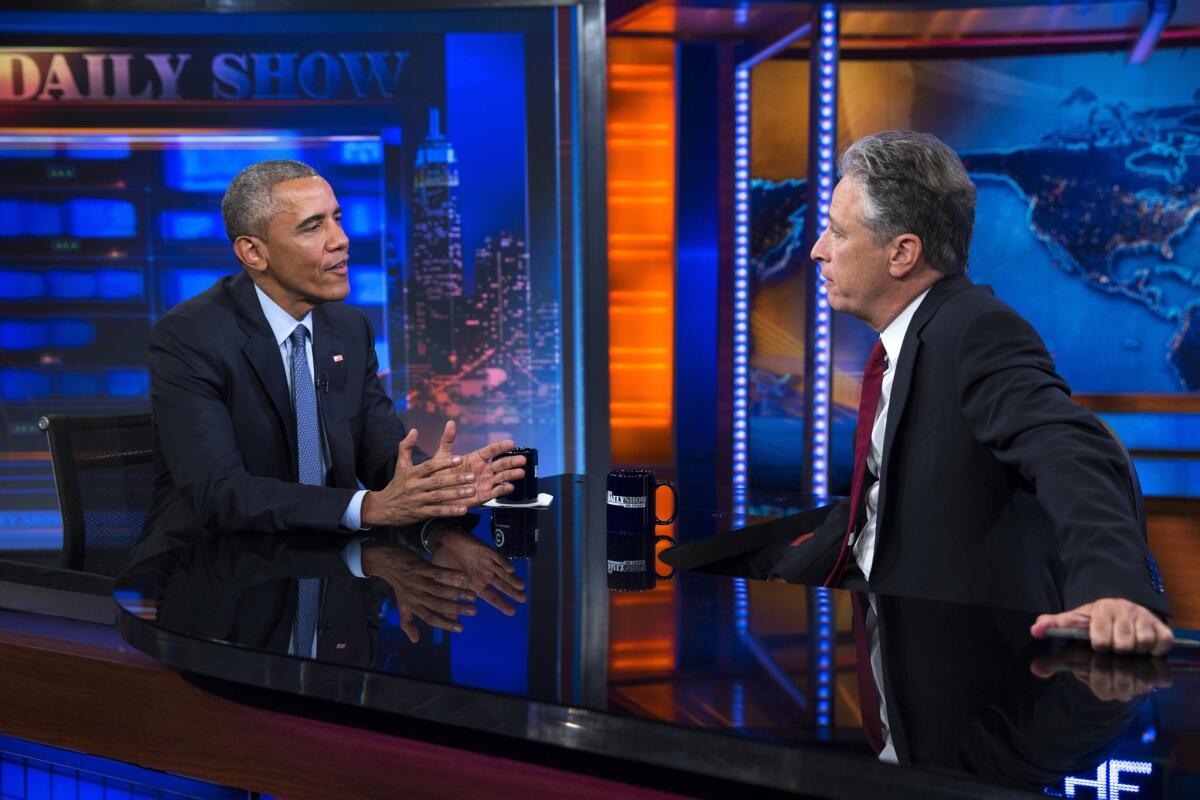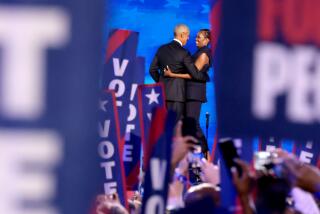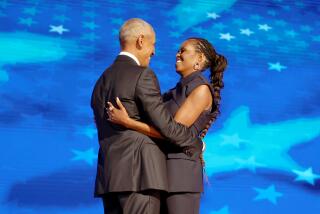Obama’s visit to father’s homeland of Kenya shows his new sense of confidence

President Obama, left, talks with Jon Stewart, host of “The Daily Show,” during a taping Tuesday in New York. The president used his appearance to aggressively promote the nuclear deal with Iran.
- Share via
Reporting from Washington — President Obama arrived Friday at an overseas destination he has avoided throughout his presidency: Kenya, homeland of his father and cradle of conspiracy theories about the American president’s personal identity.
His visit is a rejection of those debunked stories about whether he was born in the U.S. and the prejudice that underlies them, and gives Obama a chance to cross the ancestral homecoming off his presidential bucket list – or his “rhymes with bucket” list, as he recently joked about with staffers.
That he even made the joke is a sign of a new attitude on display this summer by the buttoned-down president, a cocksure bravado following his good run in recent months.
His recent successes on Iran, trade, Obamacare and other issues and an accompanying uptick in public approval validate for White House aides their working assumption that Obama can advance an uncompromising agenda with little backlash or consequence.
“Now that he is looking at the last 18 months, now that he doesn’t care what Congress thinks, he is completely free to do what he wants to do and say what he wants to say,” said Jon Favreau, Obama’s former lead speechwriter. “He’s mindful he’s got 18 months. He’s got to leave it all out on the field.”
That approach appears to be part of what led to Obama’s decision to finally travel to Kenya.
Almost every year during his term, one aide said, someone in the White House suggested putting the trip on Obama’s schedule. The prospects were complicated in part by pending International Criminal Court charges against Kenyan President Uhuru Kenyatta stemming from violence after the 2007-08 election cycle, which were dismissed in December.
More than that, the president wanted to be careful not to make the trip appear personal, or as though he might favor the country where his father grew up. Instead, according to one senior administration official, Obama wanted to emphasize the U.S. relationship with the entire continent of Africa.
Now, the feeling among Obama and his senior advisors is that his foreign policy is well-known, and the perception of favoritism is no longer a risk. Obama has been to Africa three other times and visited several African countries.
The trip to Kenya strikes some analysts as symbolic of Obama’s confidence as a two-term president with a number of accomplishments and no future political ambitions.
“There was so much unwarranted speculation, people trying to pretend that this was his birthplace, questioning his citizenship,” said Steven Taylor, professor in the American University School of Public Affairs who writes about race and political culture in the U.S. and Africa. “One of the reasons might be that he just avoided this so that wouldn’t be a controversial issue when he was up for reelection.”
“When he was running before, he emphasized his mother’s ties to Kansas, the heartland,” said Taylor. “He was trying to let people know of his long historical roots in America.”
“People know who he is now,” Taylor said.
Among the public, Obama’s ratings stabilized in the spring and early summer around 46%, according to Gallup researchers. American opinions of presidents in office for a long time are mostly solid and resist change, and Gallup noted in its July report that the Obama’s Iran deal hadn’t had any noticeable effect on how the country thinks he is doing his job.
The White House has taken note of his popular support, particularly its stability, and showcased his increasingly no-holds-barred approach in his new sales pitch for the deal he struck to neuter Iran’s nuclear weapons program. In remarks to the Veterans of Foreign Wars and in an appearance on “The Daily Show” this week, Obama compared the deal’s opponents to backers of the Iraq war, an assertion the White House previously backed away from when it provoked a fury.
“He does not want to leave here and think that there is a single issue he held back on, a single comment he wanted to make that he was too afraid to make,” Favreau observed. “And to me, that’s what he’s doing right now.”
Obama’s new brashness is on display in small ways too. He recently admonished an East Room heckler who confronted him loudly in what Obama called “my house,” and soon after that called out journalists who were being clumsy around “my stuff” in the Oval Office.
He appeared to be joking in both cases, but the quips stood in contrast to his careful insistence of past years about how his residence is the people’s house and he is just a renter.
More telling was Obama’s news conference following the announcement of the Iran deal, which he insisted remain almost exclusively focused on the accord. He openly scoffed at a reporter who implied he was “content” to let Americans remain imprisoned in Iran while the international community prepared to lift sanctions on Iran in exchange for it limiting its nuclear activity. He refused to answer a question about Donald Trump.
“Overall, I don’t feel particularly guarded,” Obama told “Daily Show” host Jon Stewart. “I just had a press conference about Iran where not only did I stay there for an hour, I said, ‘Who else has got a question?’”
Favreau thinks Obama’s single-minded focus on his goals is a basic feature of the president’s personality, and that he has always aimed to speak plainly about his vision for the country. After all, he said, Obama campaigned on the idea of changing Washington, on “speaking hard truths, telling people what they need to hear.”
Once he was in the White House, the political climate tempered his behavior, Favreau said. New presidents always learn to take some measure of care when they speak, as their wording can crash markets, inflame allies or even start wars.
“I finally know what I’m doing,” Obama told Stewart.
“There’s no doubt that you get better as you go along,” he added. “It’s like any other job. You get more experience. But what I do think has happened is that a lot of the work we did early starts bearing fruit later.”
Follow @cparsons on Twitter for news out of the White House
NEWSLETTER: Get the day’s top headlines from Times Editor Davan Maharaj >>
MORE ON OBAMA AND KENYA:
Kenyans have sky-high hopes for Obama’s visit to his father’s homeland
From the archives: Kenya feeling snubbed by favorite son Obama
From the archives: Obama and his Kenyan father: So alike and yet so different
More to Read
Sign up for Essential California
The most important California stories and recommendations in your inbox every morning.
You may occasionally receive promotional content from the Los Angeles Times.











